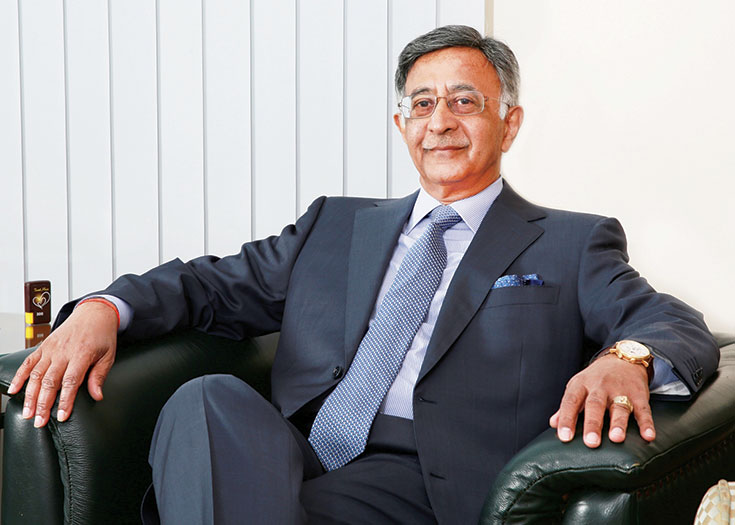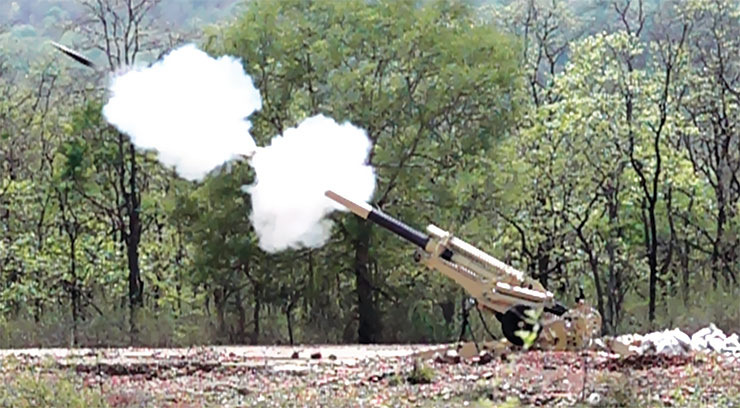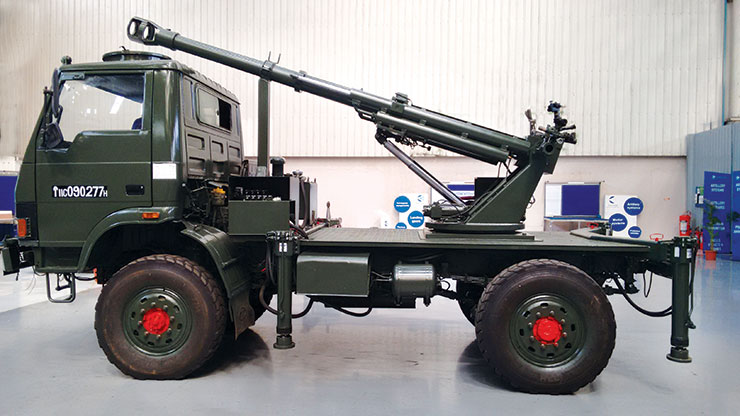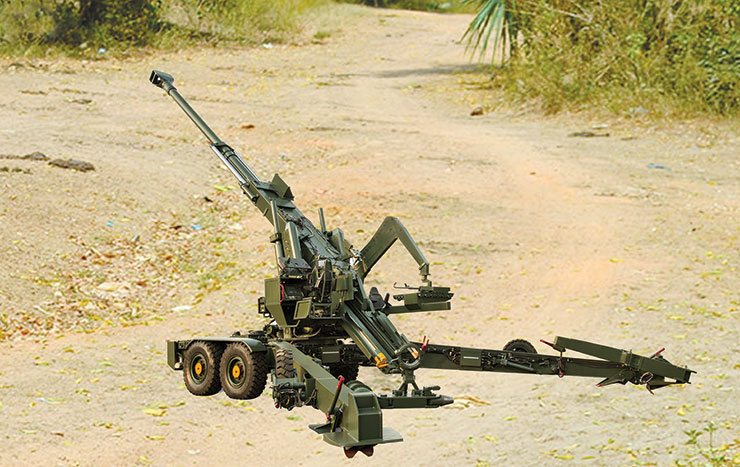
Born in a Pune-based technocrat family, Baba Kalyani attended BITS Pilani and Massachusetts Institute of Technology (MIT) for his BE (Hons.) in Mechanical Engineering and MS respectively. Baba Kalyani joined Bharat Forge, a global manufacturing company, in 1972.
Kalyani received Padma Bhushan award for contributions to Trade and Industry and was made Commander First Class of the Royal Order of the Polar Star by the Swedish government in recognition of his contribution in furthering trade and business cooperation between Sweden and India.
In an interview to PK Ghosh of Raksha Anirveda, he talked about how Bharat Forge has evolved over the years into a leading defence manufacturing company. An excerpt:
Recently, at Aligarh during the UP Defence Industrial Corridor (Announcement of Projects) event, you announced investment of Rs 200 crore for setting up an ammunition factory. Have you identified the place and other resources for the same?
Baba Kalyani. We are keen to set up a manufacturing facility along the Lalitpur-Jhansi axis in Bundelkhand region, which is a part of Uttar Pradesh Defence Production Corridor. A state-of-the-art facility, this will enable manufacturing, assembly, integration, testing and validation of various types of ammunition. Based on the magnitude of orders placed by the Ministry of Defence (MoD), we are looking forward to invest up to 200 Crores and generate employment of 500+ people in primary manufacturing and another 1000+ in secondary manufacturing activities. Our endeavours are aimed towards making world class products in the country thereby making the nation more self-reliant in defence production & technology. This will also serve the ultimate aim of strengthening India’s defence manufacturing capabilities, which is the envisaged vision for the upcoming Defence Corridor in Uttar Pradesh. We are participating in a number of tenders for ammunition and are hoping for early placement of orders in order to kick start the investments.
In a recent announcement, DAC cleared the acquisition of 150 indigenous Advanced Towed Artillery Gun Systems (ATAGS) for the Army at a cost of Rs 3,365 cr. These 155 mm/52 caliber howitzers have been developed by DRDO and would be produced by Tata Power and Bharat Forge. Please elaborate?
Baba Kalyani. ATAGS is programme of national importance developed by Defence Research and Development Organisation (DRDO) in partnership with Indian industry. Kalyani Group and Tata are the industry partners, but we supply the ordnance to Tata for this project. In a gun, the most critical aspect is the barrel and the ordnance; it’s not the wheels and the structure.

The gun was designed from scratch and we got everything right in the first firing itself. As part of our development efforts, an Advanced Gun Manufacturing facility was established at Pune. The facility is equipped with state-of-the-art machinery and is capable of manufacturing advanced artillery. The same was inaugurated by then Defence Minister in 2016. Kalyani group has carried out ab initio design of various systems by its competence and experience in manufacturing technologies, quality control system, and process control systems which proved crucial. The team of engineers, who have handled complex task, had to assimilate and absorb the armament technology. This is a commendable work and has been completed within record time of 20 months. During firing at Pokharan firing range, the Kalyani variant of ATAGS has created a new world record by registering the longest ever range of 48kms surpassing the maximum ranges of 35-40 km fired by any artillery gun in this category. The involvement of private industry by the DRDO at system level is a paradigm shift and has resulted in realising a state-of-the-art weapon platform in the fastest time frame. ATAGS is the best fit gun for the requirements of Indian Army and we are ready to supply the required numbers.
What are your plans to become global player in artillery? Are you expecting more orders for guns from Indian Army?
Baba Kalyani. I am hopeful that my Group will become one of the leading artillery houses of the world in less than five years. And we will be extremely competitive. We can build the Ultra-Light Howitzer for half the price of the current system. We can make 155/52 calibre at a much lower price than anyone else in the world. We have both the technology and technology understanding to achieve this. We have the manufacturing facilities for the ordnance, which is the most critical thing. World over, all the successful OEMs make their own ordnance. As a matter of fact, unless the ordnance of a gun is made in the country, you can never claim a gun to be truly ‘Made in India’. Normally, it takes five to seven years to make a barrel. We did it in less than two years. What’s more, we got our barrel proof-tested. We f ired the shell and stressed it to its maximum limits.
As for orders from Indian Army, they have a process, and correctly so. We not only respect that process, but are happy to go through process of testing, evaluation and certification. Advanced Towed Artillery Gun System (ATAGS) is the first step towards this and we are confident of similar orders.
Trials for artillery guns are on by the Indian Army. As you stated in one of your interview, four of the company’s artillery platforms have been tested. What next, and will the development of all these fully indigenous artillery guns. Please comment?
Baba Kalyani. All our guns are at various stages of testing. Bharat 52, the first 155mm/52 cal gun which we have developed were sent for complete trials to get the ballistics, range table, accuracy and consistency in place. This is being done in two ranges, Balasore and Pokharan.
Garuda 105 has been extensively tested in India and abroad. It is a Hybrid recoil gun which is a new technology that we have developed using our own design. The hybrid part is the metallurgy which reduces the weight and the recoil force of the gun. For instance, the 105mm gun normally weighs three and half tonnes and is towed with wheels, usually by a truck. We have reduced the weight of the gun to 900 kg by using high strength aluminium and hybrid recoil system, which reduced the recoil forces. We then mounted it on a small TATA truck and fired it. So it has become a mounted gun. We developed it in collaboration with a small US company called Mandus. A slightly bigger version of this gun has been sent to the US now. Mandus wants to showcase it to the US Army.

We have made our own version of the famous M777 ultra light howitzer, one in titanium and another in steel. The titanium version is four and half ton. The technical specification says that it has to be below five tonnes. The steel version is 6.7 ton. We took this version to Itarsi for firing in June this year, where it performed exceedingly well. A third variant is also underway – Super ULH, which incorporates the hybrid recoil technology which further brings down the weight of the gun to 3.2 tons. The Indian Army needs such products.
Kalyani Group inked three MoUs in defence space at the 4th Indo-Russian Military Industrial Conference (IRMIC) in Moscow on August 23. Which segment of defence sector it is catering to?
Baba Kalyani. The MoU with Technodinamika was signed for Landing gears and Rocket Launchers for Ka 226T Helicopters, Mi series helicopters and other helicopters and Auxiliary Power Unit (APU) for helicopters and other fixed wing aircrafts. The cooperation covers co-design, development, manufacture, assembly, integration, testing and after sales service.
The MoU with UVZ was for cooperation for programmes like 125-mm smoothbore gun 2A46M/2A46M5, automatic loader of T-72, and repair and modernisation of T-72 and T-90. The third MoU was signed with Orsis for cooperation in programmes related to requirement of Sniper Rifles in India.
What’s your take with regards to Ka 226T helicopters as your company is supposed to be involved in its development process?
Baba Kalyani. We look forward to contributing to this programme and working jointly with HAL and Russian Helicopters.
Kalyani Group hopes to garner substantial revenue from defence sector by this fiscal-end. Is this on domestic orders or international?
Baba Kalyani. I would put our current turnover to about Rs 500 crore in the defence business. We envisage rapid growth in this because we have started to supply a lot of defence hardware to the Indian armed forces. In the artillery category we already have the purchase order for limited number of ATAGS, and are expecting more orders as discussed. We are also in talks with some neighbouring countries who have shown interest in the guns. We have also dispatched the first consignment of dual technology mine detector with ground penetrating radar build for the first time in India. We have the order for 1050 of these.
Kalyani Group has collaborations / JVs with Rafael, Elbit Systems, etc. How has been the progress so far?
Baba Kalyani. We are working on a number of joint ventures (JVs) and strategic partnerships with global Original Equipment Manufacturers (OEMs) in order to bring in technology and undertake joint production and manufacturing in India as part of our commitment to ‘Make in India’. We have two joint ventures, BF Elbit Advanced Systems with Elbit (Israel) for Artillery systems and Kalyani Rafael Advanced Systems (KRAS) with Rafael (Israel) for Missile and Air Defence technology, BMP upgrade and Advance Armoured solutions. Both the JVs are progressing well. KRAS is one of the fastest growing JVs which has also been granted defence industrial license by the Department of Industrial Policy and Promotion (DIPP). KRAS state-of-the-art manufacturing facility at Hyderabad is spread across an area of 24,000 sq. ft., and will enable indigenous production of high tech Air Defence systems, New Generation Precision Guided Munitions (NGPGM), Long Range Guided Bomb (LRGB), MRSAM, LLQRM, QRSAM as well as the Naval Gun Program and Drone Dome System. This JV will bring-in niche technology in the country for such advanced defence systems, and address the critical need of our armed forces in these areas. We have strategic partnerships and technology tie-ups with many other leading foreign OEMs for various other defence products.

Recent media / analyst reports suggest that Make in India initiative by the government has fallen short of expectations and don’t see a future for it considering various factors at play. Your comments / views?
Baba Kalyani. I don’t think that is correct. The government has taken many steps in easing out various roadblocks, including various policy and procedure related changes. In DefExpo 2018 earlier this year, we saw Indian companies exhibiting Indian products in far greater number than before. The government / MoD has assured full support in not only promoting indigenisation but also in promoting exports of defence products from India. The need of the hour for the government is to continue with this momentum and introduce many more such encouraging steps which will give the right impetus to the private industry for establishing a vibrant defence industrial base in the county. DPP 2018 is eagerly awaited by the industry, with hopes that it will remove the lacunae from its previous versions and further the cause of self-reliance and self-sufficiency in defence production.
You (Mr. Baba Kalyani) have recently been included in the Government-constituted Prime Minister’s Science, Technology & Innovation Advisory Council (PMSTIAC), which will assist the government in using science, technology and innovation for “solving socio-economic problems”. How do you visualise this?
Baba Kalyani. Technology and innovation are the cornerstones of progress in any country. I am honoured to be a part of this council. We look forward to debottlenecking innovation in country in the coming years and are hopeful to see a number of startups coming up (mushrooming) in the field of Science and Technology.








